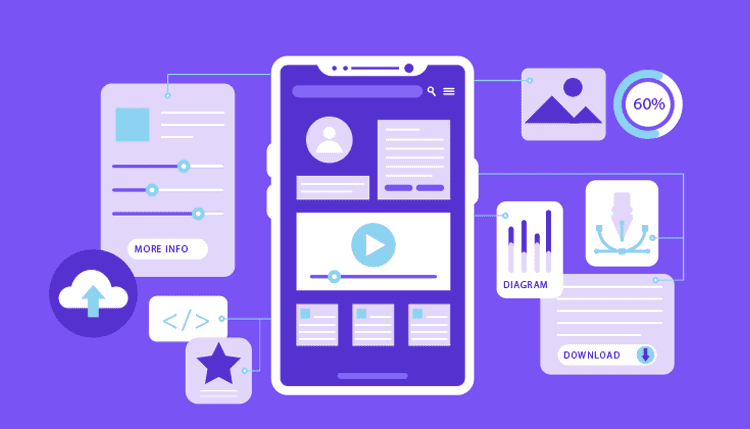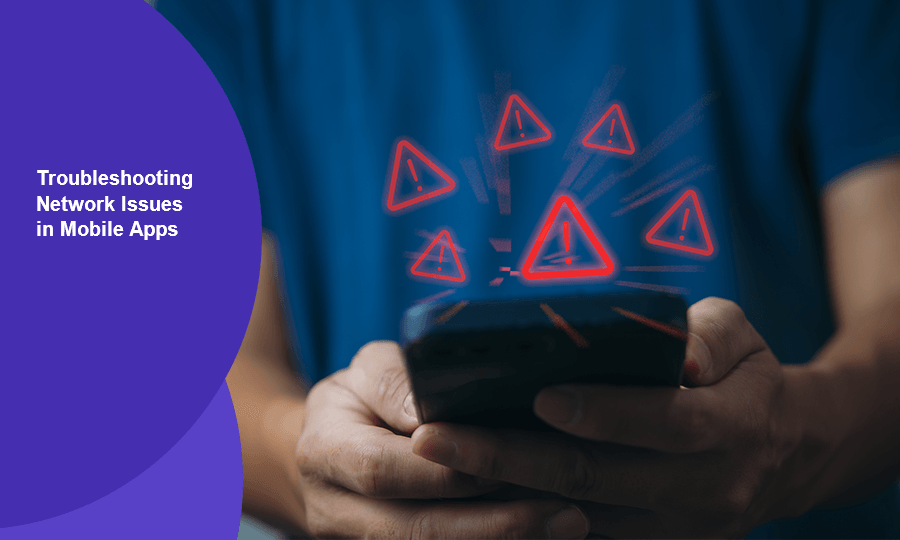In today's fast-paced digital landscape, mobile applications are the lifeblood of various businesses, facilitating seamless communication, transactions, and entertainment. Whether it's a custom Android app development company, a custom mobile application development company, or a custom app development company, ensuring a robust and reliable mobile app experience is a top priority. However, network-related issues can often degrade the user experience, causing disruptions, lag, or even complete application failure.
This article will delve deep into the common network issues that affect mobile apps and explore troubleshooting methods that can help businesses, app developers, and custom mobile app development services improve app performance.
Understanding the Importance of Network Connectivity in Mobile Apps
Mobile apps today rely heavily on real-time data exchanges. Whether the app is fetching data from a remote server, sending information back, or enabling peer-to-peer communication, network connectivity is the backbone of modern mobile applications. When the network is unreliable, the entire app experience can suffer. This can affect user retention and ultimately lead to negative reviews and a tarnished brand image for any custom mobile application development company.
For instance, if a company providing custom Android app development services releases an app that frequently disconnects or performs poorly in low network conditions, users will quickly seek alternatives. Therefore, identifying, troubleshooting, and mitigating network issues is paramount for any custom mobile app development company looking to create a seamless user experience.
Common Network Issues in Mobile Apps
1. Slow or Unreliable Connections
Many apps require constant data exchanges to function correctly. A slow connection may cause delayed responses, making the app appear unresponsive. Additionally, an unstable connection can lead to data corruption or incomplete transactions, which is especially problematic for financial or e-commerce apps developed by custom app developers.
2. Packet Loss
Packet loss occurs when data packets traveling across a network do not reach their destination. For apps that rely on real-time data, such as messaging apps or online games, packet loss can lead to delays, glitches, or complete app failure.
3. Network Latency
Latency refers to the time it takes for data to travel from one point to another. High latency can result in delayed interactions within the app, affecting user satisfaction. This is especially challenging for real-time applications like video streaming or communication apps that require low latency for optimal performance.
4. DNS Resolution Issues
Domain Name System (DNS) resolution is the process by which a domain name is translated into an IP address. If the DNS server fails or experiences slow response times, it can lead to significant delays in-app functionality.
5. Firewall Restrictions
Some networks employ firewalls that may block certain app functionalities. This can prevent users from accessing specific features of the app, especially those relying on external APIs or servers.
6. Network Timeouts
Timeouts occur when a request takes too long to complete. This can happen if the network connection is too slow or the server is overloaded. In mobile apps, timeouts often result in failed requests, which can disrupt the app's functionality and user experience.

Troubleshooting Network Issues in Mobile Apps
To improve the performance and reliability of mobile apps, custom mobile application development companies must employ various troubleshooting techniques to identify and resolve network issues. Here’s how:
1. Monitor Network Connectivity and Performance
A custom mobile app development company should integrate network monitoring tools during app development and after the app's release. These tools can track connection speed, packet loss, latency, and overall network stability.
- Network Profiler: For Android apps, the Android Studio Network Profiler provides a detailed view of network activity, helping custom Android app development services monitor outgoing and incoming requests and analyze their performance.
- Third-Party Tools: Tools like Charles Proxy, Wireshark, or Fiddler can be used by custom app developers to inspect HTTP/HTTPS traffic, helping identify bottlenecks in data transfer.
2. Optimize API Requests
A significant part of app-network interactions involves making API calls. If these calls are not optimized, they can lead to slow app performance or even failure during high traffic periods.
- Batch API Requests: Instead of making several individual requests, batch them together. This reduces the number of network calls and improves the overall speed of the app.
- Compression: Compressing data before sending it over the network can reduce the amount of bandwidth required and help mitigate the effects of slower networks.
Custom app development companies should also consider setting up automatic retries for failed API requests, which can help recover from temporary network issues.
3. Handle Network Latency with Grace
Custom mobile app development services must anticipate high-latency networks, especially in regions with poor infrastructure. There are several techniques to manage latency:
- Asynchronous Operations: Always make network requests asynchronously to avoid blocking the main thread. This ensures the app remains responsive even if the network is slow.
- Caching: Caching data locally can minimize the need for repeated network requests, enhancing performance during periods of poor connectivity.
- Progress Indicators: Displaying loading spinners or progress bars can help users understand that the app is processing a request, preventing them from assuming the app has crashed.
4. Test on Different Network Conditions
Custom mobile application development companies should rigorously test their apps under various network conditions, including 3G, 4G, 5G, and Wi-Fi, to identify potential issues.
- Simulate Network Speeds: Many development tools, such as Android Studio, allow developers to simulate different network speeds.
Custom Android app development companies can test how their apps behave under slow or intermittent networks and optimize performance accordingly.
5. Implement Offline Mode
Not all users will have access to a stable network connection at all times. Therefore, custom mobile application development services can consider implementing an offline mode, allowing the app to function without constant internet access.
- Local Storage: Data can be stored locally and synced with the server once a connection is restored. This is particularly useful for apps that deal with data entry, such as note-taking or productivity apps.
- Error Handling for Offline Scenarios: Ensure that the app gracefully handles cases where the network is unavailable. This involves displaying user-friendly messages indicating that the app requires an internet connection to proceed.
6. Optimize for Battery and Data Usage
Network-related processes can drain a user’s battery and consume large amounts of data, especially in apps that require frequent communication with servers. Custom app developers should aim to create lightweight network interactions that consume minimal resources.
- Reduce Polling Intervals: Polling servers for updates at high frequencies can waste bandwidth and drain the battery. By optimizing the polling intervals or using push notifications, a custom mobile app development company can minimize these effects.
- Background Data Usage: Consider controlling the amount of data used when the app is running in the background, and inform users of potential data consumption.
7. Optimize DNS and IP Configuration
As DNS resolution can cause delays, custom mobile application development services should ensure that DNS servers are reliable and fast. Furthermore, techniques such as DNS prefetching can help reduce lookup times.
- Use CDN: Custom Android app development companies can leverage Content Delivery Networks (CDN) to serve app data from the server closest to the user’s location. This can drastically reduce latency and improve loading times.
- Fallback Servers: In cases where the primary server is unreachable, custom app developers should have fallback servers or IP addresses ready to ensure continued service.

The Role of Custom App Developers in Network Optimization
Custom app developers play a crucial role in addressing network issues from the design phase to deployment. From implementing efficient coding practices to testing the app under varying network conditions, developers within a custom app development company must adopt a proactive approach.
Many custom Android app development companies and custom mobile app development companies are now focusing on DevOps practices. Continuous integration, delivery, and monitoring can help detect and fix network-related bugs early, minimizing the impact on the end user.
The Impact of Network Issues on Business
Network issues can severely impact a business’s reputation, revenue, and user retention. A custom mobile application development company that fails to address these issues risks losing customers to competitors. Conversely, businesses that partner with reliable custom mobile app development services can enhance their apps' performance, resulting in better user experiences and stronger brand loyalty.
Custom mobile app development companies must prioritize network optimization to create seamless experiences for their users. Given the diverse network environments that apps are used in, a well-optimized app can thrive regardless of connectivity issues.
Final Thoughts
In a world where mobile apps are an integral part of our daily lives, network issues can make or break the user experience. By adopting the right troubleshooting techniques, custom Android app development companies and custom mobile app development companies can mitigate these issues and ensure their apps perform optimally across all network conditions.
Through continuous monitoring, testing, and optimization, custom mobile application development services can address network problems, reduce latency, and ensure a smooth user experience. Ultimately, the goal for any custom mobile app development company is to create resilient, high-performance apps that can withstand the inevitable fluctuations of network connectivity.
By leveraging best practices in network troubleshooting, businesses and custom app developers can provide better services, enhance app reliability, and maintain a competitive edge in the marketplace.













































